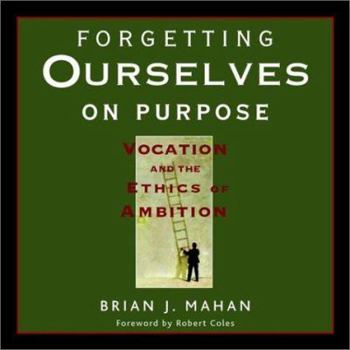Forgetting Ourselves on Purpose: Vocation and the Ethics of Ambition
Select Format
Select Condition 
Book Overview
In the wise and often witty Forgetting Ourselves on Purpose, Brian Mahan considers the question of how it is possible to create a meaningful spiritual life while living in a culture that measures us... This description may be from another edition of this product.
Format:Hardcover
Language:English
ISBN:0787956333
ISBN13:9780787956332
Release Date:January 2002
Publisher:Jossey-Bass
Length:209 Pages
Weight:0.95 lbs.
Dimensions:0.8" x 6.4" x 8.2"
Customer Reviews
3 ratings
life-changing
Published by Thriftbooks.com User , 15 years ago
I first read this book in 2002 and have reread it several times. I have also bought copies to give away- something I never do! I affirm all the great reviews that have been written and I would not even need to write another, but for the one angry one. Not that other opinions are impossible- but this level of disgust seems out of proportion. By reading the editorial reviews- which give a fine idea of the type of literary/conversational book this is-and using the "look inside the book" function- there is no need to make this kind of mistake. Likewise, why would someone spend four hours on a book they don't care for? (And if you zip through this book in one sitting you have failed to follow some of the experiential suggestions.)
Selfless ambition
Published by Thriftbooks.com User , 19 years ago
This is no ordinary book. As author Brian Mahan says his in preface, `reading this book is not a spectator sport.' In many ways, this is just like life - we have to get into the mix (or, to take another example from Mahan's introduction, join in the dance) for it to become meaningful, worthwhile, and all the other positive words one would normally insert here. This is a book that invites active engagement. Mahan does not argue so much as persuade, and even then, it is more of a presentation than a direction. Mahan developed this book out of a course he taught at the University of Colorado, and later Emory's seminary and high school advancement programme - the course has always been popular, Mahan states, but it isn't always clear why. Mahan attaches some of the popularity to the presence of the word `ambition' in the course title (which is also part of the subtitle of this book) - the focus of the world is often on success, and rising high school and college students are often ambitious in various ways. However, it is not the kind of political/corporate ambition, or the kinds of ambitions that make soap operas interesting to watch sometimes, that Mahan develops here (although these types are not disconnected from what Mahan writes). Mahan is looking more directly at the ambition toward self and self-fulfillment. Mahan develops ideas of paradox throughout the text. How can we honestly pursue self-abandonment if the very pursuit shows an attachment to self? When can success end up being a failure, and how is failure often a success? Mahan uses personal stories and experiences as well as the tales of those around him to illustrate the various points - he also draws on history, sometimes the lesser known bits. For example, to highlight the failure of success, Mahan draws upon the curious dinner between film star Rudolph Valentino and curmudgeonly writer H.L. Mencken - Mencken was ostensibly consulted on how to deal with the press, but figured out later that what Valentino really sought was validation and direction in how to turn his failure of a successful career into something with true meaning. This is perhaps the heart of Mahan's text as a whole - the search for meaning in life. What is point of success if it has no meaning? Meaning requires more than simple (or even elaborate) gratifications of the ego, the flesh, the persona. It requires an honest appraisal of who we are as individuals, how we relate and fit in to our communities (large and small), and how our lives are responding to the vocations, the `higher callings' if you will, that have been given to us. Mahan is a Roman Catholic layperson, so many of his stories draw from this tradition. However, Mahan's text is drawn broadly enough to incorporate people from all faith traditions, or those with no particular tradition or affiliation. Mahan's story about sneaking into heaven is a good example - as a child, Mahan had experiences with a particular convent in Bos
Best Book on Vocation
Published by Thriftbooks.com User , 22 years ago
I absolutely adore this book. I've grown tired of books on vocation that have a "pie in the sky" approach to living a spiritual life, as if everyday working people have the financial resources to devote themselves to a life of good deeds. Brian Mahan has a great way of bringing two worlds together---the need to pay the bills and the need to make a positive contribution to the world. Turns out you can do both!I also like his "spiritual retreat" approach. He incorporates spiritual exercises at the end of each chapter which really help to focus attention on living a life of integrity. Finally, this is a practical and inspiring book---but a book with a humorous edge---that unites compassion and ambition in a fresh, new way.Read this book!




